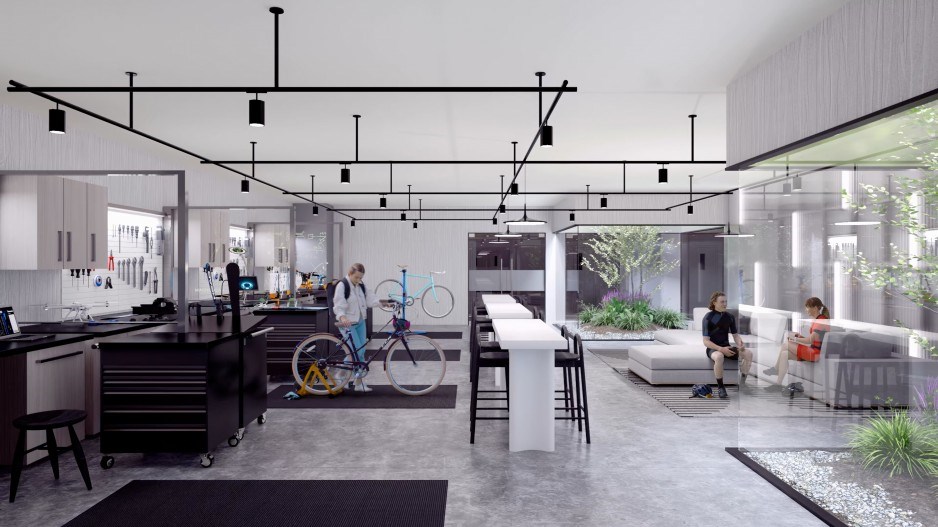A Metro Vancouver condo project is planning to build a 50,000-sq.-ft. facility dedicated to bicycles and their users – among the largest of its kind in the world – to promote both wellness and sustainable transportation in the community.
Concord Pacific Developments Inc. announced this week that the Concord Metrotown community – a multi-tower project adjacent to the Metropolis at Metrotown shopping centre – will include the planned facility, which will house above-ground amenities like an indoor bike loop, gear room, spin studio and bike storage.
Officials at the Vancouver-based developer said the hope is that – by incorporating bikes as a major component of the urban lifestyle in Burnaby’s central corridor – it creates the environment to promote not only healthy living through bike usage, but also aid in creating sustainability by making it easier for future residents to use bikes as the main mode of transport.
“We believe people will pick up on this very quick, so the market response will be very strong,” said Peter Webb, senior vice president at Concord Pacific. “Really, it’s all part of the DNA at Concord where we are all future-forward in our thinking of how to protect the investment of buyers of homes in our projects. In the case of the bicycle, it’s pretty clearly an opportunity to blend two significant agendas for Concords: Healthy living and its confluence with sustainability.
“As you ride the bicycle, you are also reducing your carbon footprint on the globe as a result instead of using other modes of transportation,” he added.
One leading urban planner who has been emphasizing the need for Metro Vancouver to shift into more sustainable commute patterns said he is encouraged to see a major development make such a commitment to bike usage. However, he added that without an overall strategy incorporating bike facilities at employers and other feature developments, one large bike facility will not do much to change people’s lifestyle behaviour.
Andy Yan, director of the City Program at Simon Fraser University and one of the region’s leading voices on urban planning, noted that distinction must be made of whether large bike facilities (like the one planned at Concord Metrotown) are geared towards recreational bike users or actual commuting – the latter of which is essential for actual impact on sustainability.
“Not to say this is a totally bad idea, but it needs to be part of an overall strategy,” he said. “What is the relationship with city to connect [Concord Metrotown] with other parts of the city?
“There’s recreational biking versus commuting, the day-to-day and almost chore-like activities,” he added. “And how many people besides the hardcore cyclists and their families really do it, versus other suburban families? And that’s a big question: Is this more for recreational bikers? I don’t think this is, which brings us to the next question of how this is connected to the rest of the city?”
Yan noted that, according to the 2016 Canadian census, a paltry 1.1% of Burnaby residents use bikes as the means to commute to and from work, lower than both the Metro Vancouver regional figure of 2.3% or Vancouver’s figure of 6.1%.
However, Yan did say that a facility like Concord Metrotown’s becomes much more effective in promoting sustainability if bike users use bicycles as a part of the commute while also incorporating things like transit (SkyTrains and buses). He noted that the same 2016 Census figures showed that Burnaby residents were much more likely to use transit for commute, with the figure of commuting transit users at 29.4% - almost on par with Vancouver’s own figure of 29.7%.
The key, Yan said, is for officials like Burnaby’s municipal government to develop a comprehensive plan to link bike users in communities like the future Concord Metrotown development to viable networks of bike-centric services – allowing cyclists to transition onto SkyTrains and buses in places where they cannot reach on bikes alone, while making sure that the destinations also accommodate bikes.
“The bike facility by itself is not as useful as the overall strategy within the city of Burnaby,” he concluded.
Webb, however, said there has to be a first step, and Concord Metrotown demonstrate Concord Pacific’s commitment to a sustainable lifestyle.
“Our concepts are typically taken by other developers and literally taken around the world,” he said, adding that items such as the idea of moving the bike facilities to ground-level and above - as well as implementing bike elevators - is a change of perspective that the developer hopes will entice more people to partake in biking, even if they are not cyclists when they move in initially.
“The concept is that the bike facility is a bit of a community space,” Webb added, calling it a ‘platform of wellness’ where people can help each other live more healthily and sustainably. “People will help each other fix and repair their bikes... I’m not saying 100% of the home owners [at Concord Metrotown] will be cyclists, but even association with people who are interested in biking is a healthy choice.”
Webb also noted that Concord Pacific is actively planning for similar measures in all future projects, as officials anticipate municipal governments in Metro Vancouver and throughout Canada to begin increasing the bike allowances at condo developments in the near future to meet sustainability goals and reduce emissions.




